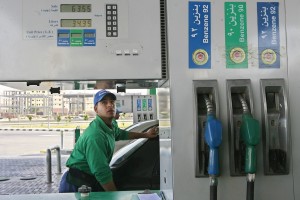
(AFP Photo)
The National Centre for the Protection of Markets and Consumer (NCFPMAC) urged President Abdel Fattah Al-Sisi to end the “government recklessness” with its plan to increase fuel prices.
The non-governmental institution issued an official statement Saturday, explaining that “wrong economic steps” are being taken to reduce the budget deficit. The centre added that lack of supervision will lead to increases in transportation fares.
Ahmed Karem, the General Coordinator at the centre, said that transportation costs are expected to increase by 25 piasters within cities. He added that the increase will vary between EGP 1 and EGP 5 for transportation between governorates.
The first increase in fuel prices took place in July 2014, when the cabinet raised the price of 95-octane petrol to EGP 6.25 from EGP 5.85 per litre, 92-octane petrol to EGP 2.60 per litre, and diesel and kerosene to EGP 1.80 per litre.
The Central Agency for Public Mobilization and Statistics (CAPMAS) also estimated that public transportation fares would rise between 2.3% and 7%. Prime Minister Ibrahim Mehleb mentioned that the base fare for white taxis will start at EGP 3, up from the current EGP 2.5.
Reports from the street, however, indicated a rate of increase in transportation fares of between 35% and 50%.
After the first increase, experts predicted that food commodity prices would increase by more than 20%, adding that it will place a burden on farmers who already suffer from various economic strains.
Karem said that the cost of agriculture will also increase as a result of the price surges, which will be witnessed in the production and transportation of fertilisers.
The report added that heavy industries, which rely mainly on fuel in their production processes and in transportation, will also suffer.
In late 2014 and early 2015, oil prices decreased significantly to reach $59.3 per barrel, the lowest rate since 2009. Many experts expected that this price decline will reflect positively on the state budget.
The centre’s report pointed out that despite the 60% drop in oil prices; trade balance did not reflect notable improvement. The centre attributed this to the government’s “wrong policies”.




